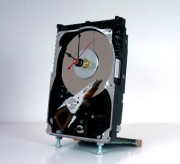Ubuntu and damage to the hard drive

Today I found out the most unpleasant news - Ubuntu Linux, due to the incorrect operation of the power daemon script, can damage the notebook hard drive by its constant stops and starts (trying to save (ha!) Electricity).
This resource is quite important for hard drives, and for modern models it is about 600,000 times. Load Cycles is increased by one at each stop-acceleration of the hard drive spindle or when parking / deparking its head.
')
Installing the smartmontools package and running the command sudo smartctl -a / dev / sda | grep Load_Cycle I was just horrified. 47597 Load_Cycles for not so long time of work of my laptop. Moreover, while I was talking about this to a friend, this value increased to 47,626 and apparently it was not going to stop there.
She just kills me the screw! After going through the links and reading the information, the solution was found - you need to disable advanced power management from the hard drive. More information is provided in the relevant topic ubuntuforums.org, in this post .
I did the check for myself in the way I suggested in this post ubuntu_demon
aac @ aac-laptop: ~ $ sudo hdparm -B 255 / dev / sda
/ dev / sda:
setting Advanced Power Management level to disabled
aac @ aac-laptop: ~ $ sudo hdparm -S 0 / dev / sda
/ dev / sda:
setting standby to 0 (off)
After that, Load_Cycle_Count stopped, and it remains stable for an hour now, and before that it increased by one in one to five minutes (I note that the laptop is connected to the network and runs on power, so the problem is observed anyway). Screw saved ...
ps In some configurations, you need to pass the parameter not 255, but 254, i.e. sudo hdparm -B 255 / dev / sda .
Nominally the problem is solved. However, I used to love Ubuntu, I thought that Linux was designed to make working with the system more reliable, more stable. Yes, Linux is not only Ubuntu, but many people share the love for this distribution (and for good reason).
Now I don’t trust my operating system, and while typing this post, I think - how is it different now for me from Windows? ..
Added by
As it turned out, the problem was that Linux is too honest with the hardware and follows the settings set in the BIOS or in the firmware. “Unfair” Windows and MacOS ignore these settings and use their own. It seems like the latter are doing wrong.
However, in my memory, this is not the first time that following what is written in the device (read “standards”) leads to incorrect system operation. I had a similar situation with one cheap monitor, when, after long suffering, I had to turn off the reading of information on DDC and find a modeline using scientific brute force that would suit him. At the time, in unfair windows, this modeline was registered in the drivers long ago.
Such confusions, it seems to me, quite significantly interfere with the advancement of the charming Linux operating system to the masses. Let's hope that in the future we will not have to face problems of this kind.
Thanks Shark for the comment.
ps By the way, it is very interesting, if this problem is not Ubuntu, then why is it not manifested in other distributions?
Source: https://habr.com/ru/post/15616/
All Articles